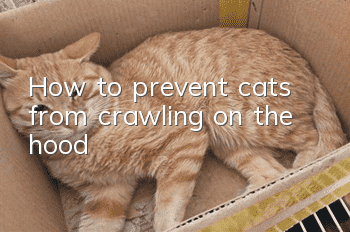What should I do if my cat wets the bed? What causes cats to wet the bed?

If you have followed all the rules for using the litter box and litter correctly, but your cat still poops on the bed, it may be due to one of the following reasons.
What causes cats to wet the bed
1. Disease
Even though some cat owners will tell me that their cats are perfectly healthy, when their cats have behavioral problems I always recommend that they go to the vet first to get checked out.
Cats may suffer from many diseases, such as urinary diseases, diarrhea, constipation, enteritis or other chronic diseases, but cats are very good at hiding discomfort. This is their instinct, because if they show discomfort, the cat’s natural enemies or opponents (other cats) will You will know that it is very weak now, which will seriously threaten its survival.
In addition, if the cats at home are older, arthritis and DJD (degenerative arthritis) will also affect their ability to enter the litter box to go to the toilet. Therefore, for such cats, you need to choose litter boxes that are easy to enter.
2. The owner’s own problems
Owners may put great pressure on their cats for a variety of reasons. When the pressure makes the cats unable to adapt, they will excrete on the owner's bed. This behavior does not mean that they are angry with the owner. , but it means that they are very uneasy now and hope to change the things in their living environment that make them uncomfortable in this way.
For example, frequent quarrels between couples will significantly increase the chance of cats defecating on the bed. Similarly, when the cat jumps on the dining table (because they have no other higher place to go, and most cats always feel unsafe on the ground), if the scavenger yells at the cat, it will also It will increase the possibility of cats defecating on the bed. In addition, many scavengers try to control their cats, such as picking up the cat frequently, which may also increase bed defecation behavior.
3. Boring
Most cat owners think that cats are solitary animals, which is not wrong, but because they are now accustomed to living with humans, and because the urban living environment allows them to move only in a small area, in order to better To survive, their habits have changed to a certain extent, such as learning to socialize.
Today’s (domestic) cats have no way to leave their owners, so when the cat owner goes on a business trip or travels, the cats at home will be very sad, because this breaks their living habits, and a stable routine is the source of their sense of security.
Cats like to do the same thing at a fixed time every day. If thisIf this situation is not achieved, they will be panicked, feel uneasy, and then have the behavior of urinating on the bed because the bed has the smell of the owner. This behavior is also a typical symptom of separation anxiety. The behavior of defecating on the bed may occur when the owner goes out, or when the owner returns after being out for a long time.
4. Change
As I just said, cats like a regular life and they hate change. Big changes caused by moving can have catastrophic consequences for cats and you, but small changes can also affect cats. For example, adding new furniture to the home can cause a lot of stress for cats because they need to re- Looking at the situation in its territory, it needs to recalculate the behavior of its owner, the behavior of other family members and the behavior of other pets. If this change affects your cat's comfort in peeing, eating, and resting, they will express their discomfort in some way.
In addition, if the members of the family change, such as having a partner or children, a new pet, etc., the cat will also defecate on the bed for the same reason. Therefore, the new member should be "introduced" to them in the correct way. Cats play a very important role in preventing cats from defecating on the bed.
5. Territory issues
We can look at this issue from two angles. When a cat wants to demonstrate dominance over a territory or that it lives in an area to other cats, dogs, or humans, they often need some help feeling more confident.
Regarding the first cat, they will usually spray their own urine on the wall so that their urine (smell) is easily identifiable. They may also urinate on the bed if they want to make the bed their own or... Poop, but in this case, they don't bury their excrement. Instead, they want everyone to know that this bed belongs to them.
On the contrary, the second cat will not spray its urine everywhere, and will try to bury it if it leaves excrement on the bed. The reason for this behavior is usually that it has conflicts with other pets or family members, and the bed The location is relatively high, which can provide it with a sense of security. Additionally, the cat may defecate on the owner's bed if the resting or eating area is inaccessible due to the presence of another cat, dog, or baby.
What to do if your cat wets the bed
1. Use special products to clean sheets or quilts to completely remove the odor of cat excrement remaining in these items.
2. When the owner goes out, close the bedroom door and prevent the cat from entering the bedroom.room.
3. Play with the cat on the bed, or feed the cat something on the bed, because cats don’t like to excrete in the place where they enjoy their “good time”.
4. Increase the number of litter boxes
5. Improve the relationship between cats and other pets. (You can seek help from cat behavior experts)
6. Let new family members play with the cat, feed it and clean the cat’s litter box.
7. “Cat-friendly” design a home suitable for cats.
8. If cats feel bored or lonely, add a companion (another cat or dog) to them and make an appropriate "introduction." (You can seek help from cat behavior experts)
- What are the causes of cats losing hair abnormally?
- Why does cat hair turn white?
- What are the black dots on a cat’s skin?
- The cat suddenly loves to drink water like crazy, so don’t be too happy!
- Are cats allergic to Phalaenopsis?
- Cat’s nose is always dry but very lively
- Can cats drink tap water?
- How old do Persian cats molt a lot, and when do Persian cats molt?
- What kind of cat is an orange cat? How much does one cost?
- How should I educate my cat when he poops on the bed?



